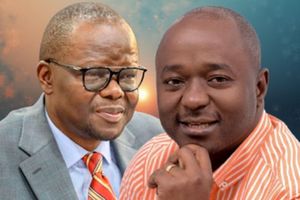
Council of Governors chairperson Anne Waiguru (centre) with her colleagues during a past media briefing in Nairobi.
Recently counties have experienced several instances of impeachments of governors. Kericho, Meru and Nyamira have been the latest.
How to create a more harmonious relationship between county assemblies and executives is an area requiring the Council of Governors to investigate and intervene.
The Council of Governors has done a good job to push for economic and financial issues that matter to counties over the years. But political stability of counties matter also.
Since 2013, more than 20 counties have experienced political instability pitting governors tussling with assemblies. It suits the interests of counties to reduce the conflicts.
There might not exist universal rules on how to calm the relationships between the two branches of county governments. Each county has unique political culture.
But the CoG has a unique opportunity to research and endeavour to propose ways of reducing these frictions. And probably the CoG can draw lessons from history.
The story of Julius Ceasar in Roman empire history remains an important lesson in the political management of entities.
Economic development
Governors’ key concern is the economic development of their people. But how to achieve that whilst wisely playing politics remains a mystery. President Mwai Kibaki is celebrated as one of Kenya's most brilliant presidents. But it is in his tenure that Kenya almost dismembered.
And therefore, as Jesus said, man does not live on bread alone. Economics and political management matter almost equally. Like the Julius Ceasar tragedy, born 100 years Before Christ, he was a Roman General who became a people's darling after leading Rome in victories against it's Gallic enemies. But he disliked parliamentarians (Senators). And they disliked him too. The Senate, the supreme body in Rome and the main embodiment of it's democracy, ordered him to step down on his return to Rome. He refused and crossed Rubicon river whilst armed, signalling his defiance. A civil war erupted and Julius won. He then turned himself into an autocrat and muzzled parliamentary powers. Senators ultimately got rid of him as they saw an attempt to destroy democracy.
The lesson one draws from Julius Ceasar tussles with Roman Senate can help one to improve relationships between county executives and many county assemblies.
And one key issue was - how would an executive branch of government create a semblance of power sharing with an assembly?
Executives comprise governors who exercise political power singularly.
On the other hand, assemblies consist of many members who exercise powers in a collegiate manner.
Singular exercise of political power requires high level of sensitivities to the needs of the other branch of government (assemblies) to avoid friction.
Political glory
One of the key desire of members of county assemblies is the need to share "political glory" in projects that counties may be unveiling. This improves their chances of their re-election. Courts have tended to deploy Montesquieu doctrine of separation of powers to deny assemblies the "glory of developmental" expenditure.
Montesquieu had argued to promote liberty, the powers to legislate, adjudicate and execute must be separate and acting independently.
This argument makes lots of sense but at times it fails to take into account the political realities of a developing country like Kenya. Kenyan voters care for leaders who do actual things - build hospitals, roads and provide water.
Legislating in Parliament might not be enough to attract votes. Therefore, governors have to design ways through which members of counties assemblies share political glory of their projects whilst evading breaching the constitutional doctrine of separation of powers.
For example, there can never be any harm if members of the assemblies propose projects in their respective wards and the executive implements them.
Ensuring assemblies endorse various county programmes ensures assemblies get the necessary respect from the executive.
On the other hand, the assembly appreciating the implementation role of the executive gives governors the legal leeway to handle execution.
The CoG can constantly engage County Assembly Forum to build more synergies.
Forums where governors interact more with assemblies as independent and interdependent organs of devolution as facilitated by CoG might help.
Parliament needs to enact a standalone law that establishes the Council of Governors and sets out it's roles clearly.
Dr Irungu Kangata is the Governor of Murang'a. [email protected]













